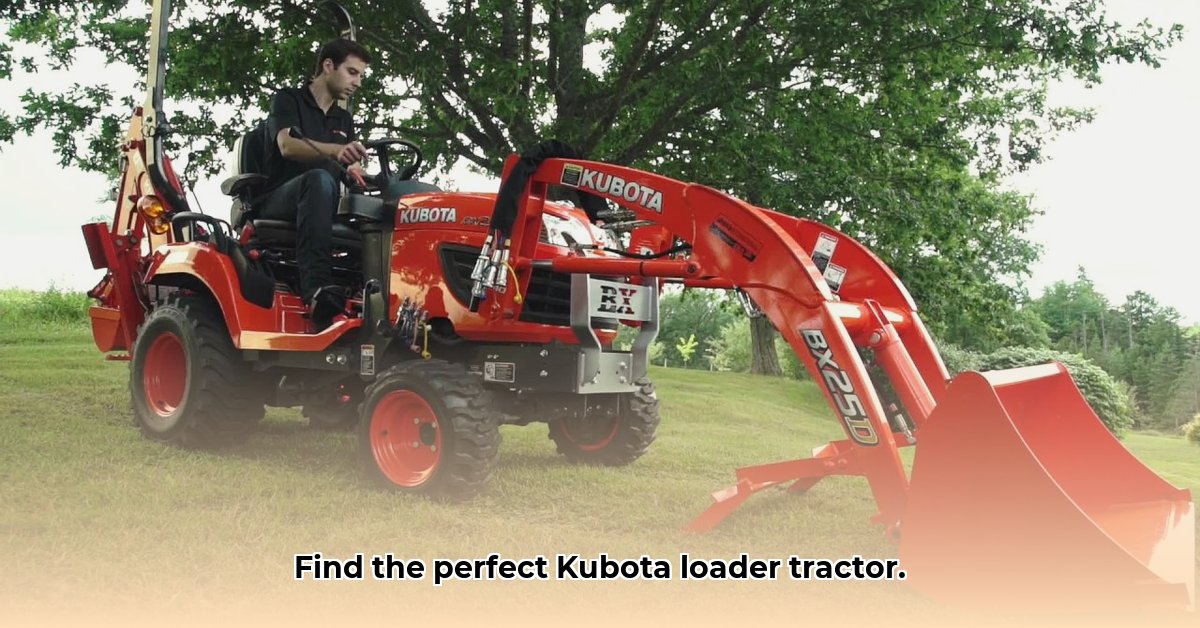
Kubota Front End Loader Tractor: Your Complete Guide to Finding the Perfect Fit
Choosing the right Kubota front-end loader is a crucial investment for any farm. This guide helps you navigate the process, from assessing your needs to finalizing your purchase. Whether you're a seasoned farmer or a first-time buyer, we'll break down the key factors to consider. Remember, the right loader significantly impacts your farm's efficiency and longevity. Are you ready to find the perfect fit? For comparisons with other brands, check out this helpful resource on tractor comparisons: tractor comparisons.
What's Your Loader Going to Do? Matching Machine to Mission
Before diving into specifications, consider your loader's primary applications. Will you primarily handle light materials like hay bales, or will it tackle heavier tasks such as moving gravel or snow? The scale of your operation is key. A small-scale farmer might find a compact loader sufficient, while large-scale operations demand more powerful models. What’s the maximum weight you anticipate lifting? This directly influences the required lifting capacity. Finally, and importantly, determine your budget. Kubota offers a broad range of models at varying price points. Setting a budget helps to narrow your search and prioritize your options effectively.
Decoding the Features: What to Look For in a Kubota Loader
Kubota loaders are renowned for their robust build and user-friendly design. Let's explore the key features:
Lifting Power (Capacity): This refers to the maximum weight the loader can lift (measured in pounds or kilograms). Heavier tasks require higher capacities.
Reach and Dump Height: A longer reach allows for loading materials from a greater distance, while a higher dump height simplifies unloading, saving time and effort.
Bucket Variety: Different buckets are designed for different materials. Consider the types of materials you will most frequently handle to select the appropriate bucket size and design, such as light-duty or heavy-duty.
Attachments: Kubota loaders offer exceptional versatility through attachments like forks (for pallets), different sized buckets, or grapples (for irregularly shaped items). This significantly expands functionality.
Comparing Kubota Models: Finding Your Perfect Match
Kubota offers several front-end loader series, catering to various needs. However, remember that specific specifications vary; always consult Kubota's official website for precise details. The following is a general guideline:
| Kubota Loader Series | Typical Use Cases | Size & Power Considerations |
|---|---|---|
| LA1000 Series | Smaller properties, light-duty material handling | Compact, ideal for smaller farms or limited material handling |
| LA1200 Series | Medium-sized farms, more demanding tasks | Increased lifting capacity and reach compared to the LA1000 |
| LA1500 Series | Larger farms, heavy-duty material handling, demanding applications | Highest lifting capacity and reach within the Kubota lineup |
Your Step-by-Step Guide to Kubota Loader Ownership
Purchasing a Kubota front-end loader is a significant investment. Follow these steps for a successful purchase:
Needs Assessment: Define your primary tasks and budget limitations. This is your starting point.
Model Research: Utilize online resources and brochures to narrow down models that meet your requirements.
Dealer Visit: Physically examine the loaders and solicit expert advice from dealers. A hands-on examination is crucial.
Test Drive: Test-driving the loader provides invaluable insights into its performance and ergonomics.
Price Negotiation: Obtain quotes from multiple dealers to secure the best possible price.
Purchase Finalization: Complete the sale and ensure all documentation is accurate and complete.
The Good, the Bad, and the Kubota: Weighing the Pros and Cons
Kubota loaders, like any machinery, offer advantages and disadvantages:
Pros:
- Reliability: Kubota's reputation for durability is well-earned.
- User-Friendliness: Many users praise the ease of operation.
- Versatility: Attachments significantly enhance functionality.
- Dealer Network: Readily accessible parts and service support.
Cons:
- Price: Kubota loaders often command a higher price compared to competitors.
- Optional Features: Some desirable features may be optional extras.
How to Choose the Best Kubota Loader for My Farm Needs
Key Takeaways:
- Matching your tractor to the correct loader is paramount for efficiency and safety.
- Consider your specific needs: tasks, weight handling, and required attachments.
- Kubota loaders are designed for specific tractor series; check compatibility.
- Research loader features: lift capacity, lift height, and bucket size.
- Regular maintenance is key to longevity.
Understanding Your Needs
Before selecting a model, honestly assess your farm's demands. What are the primary loader applications? The answers to these questions are critical. Will the loader mainly handle hay bales, or will it manage heavier materials like gravel? This directly dictates the required loader capacity.
Tractor Compatibility: The Cornerstone of Success
Tractor compatibility is crucial. Kubota designs loaders specifically for its tractor series (L, M, B, MX, etc.). Using incompatible equipment can result in damage. Always verify compatibility with your tractor’s manual or your Kubota dealer.
Key Loader Specifications: What to Look For
Once compatibility is confirmed, examine key specifications:
- Lift Capacity: The maximum weight the loader can lift, directly linked to your tasks.
- Lift Height: Impacts loading and unloading onto higher platforms.
- Bucket Size: The bucket's volume affects the amount of material moved per load.
- Hydraulic System: The type of hydraulic lift system influences the loader's precision and smoothness.
Making the Decision: Weighing Your Options
After assessing needs, confirming compatibility, and comparing specifications, carefully weigh your options. Create a comparison sheet listing compatible models, specifications, and prices. Consider that a higher upfront investment in a robust loader can prevent costly repairs and downtime in the long run. Consult reputable sources like Wickham Tractor (https://www.wickhamtractor.com/blog-posts/what-loader-fits-my-kubota-tractor/) for further guidance.